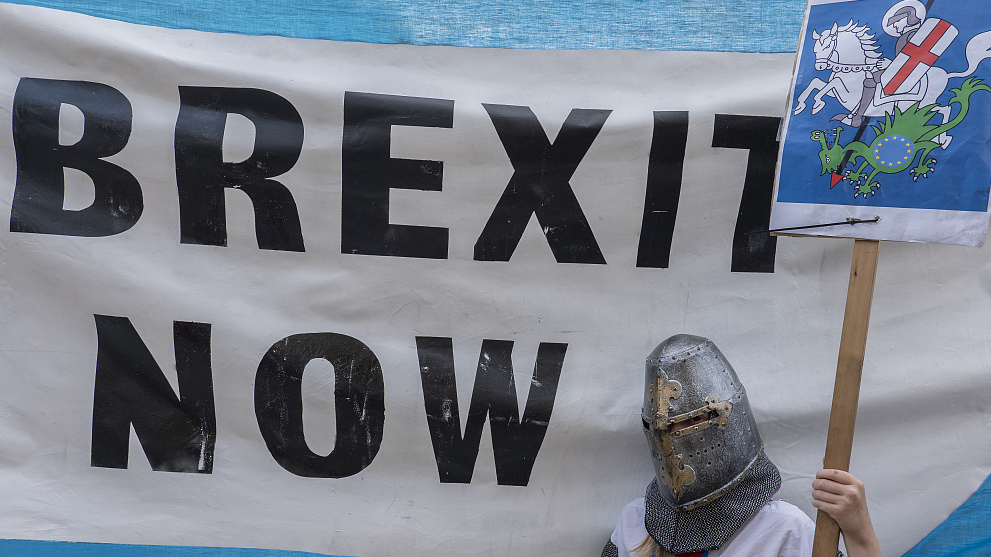

Editor's note: Simon Johnson is a former chief economist of the IMF, a professor at MIT Sloan, a senior fellow at the Peterson Institute for International Economics, and co-founder of a leading economics blog, The Baseline Scenario. He is the co-author, with Jonathan Gruber, of Jump-Starting America: How Breakthrough Science Can Revive Economic Growth and the American Dream. The article reflects the author's opinions, and not necessarily the views of CGTN.
The best way to think about the United Kingdom's political predicament and presumed imminent exit from the European Union is to read the Slough House spy novel series by Mick Herron (the sixth installment, Joe Country, just appeared). Herron writes about the modern MI5 intelligence agency and the machinery of government in general – not directly about economic policy. But he perfectly captures how bureaucracies function, as well as what political "leadership" really means in a complex world where illusion and misdirection prevail in democratic systems.
The contrast with classic spy novels, such as the early work of John le Carre, is readily apparent and part of the fun for readers. During the Cold War, the so-called Moscow Rules guided how spies could survive in hostile environments: "Watch your back" was the guiding idea. Today, according to Herron, a set of London Rules prevails, the most important of which is "cover your ass" and protect your career.
Britain has had many economic difficulties and some serious crises over the past century, and it is tempting sometimes to draw parallels – for example, to difficulties associated with the gold standard between the world wars or the Suez Crisis in 1956. But the international system is now quite different, Britain's role in the global economy is much diminished, and the pound floats freely against major currencies.

Financial market figures are shown on big screens and a ticker in the main entrance at London Stock Exchange in London, August 29, 2019. /VCG Photo
In 1956, as well as in other prominent historical episodes, preserving the value of the pound was viewed by policymakers as important, if not essential. Through at least the early 1990s, there was an ever-present fear that devaluation (relative to the dollar and other currencies, including the Deutsche Mark) would fuel inflation, which would necessitate higher interest rates and overall economic contraction.
Today, the world is quite different. Fixed exchange rates in the developed economies disappeared in the 1970s, first with a bang (the devaluation of the dollar under U.S. President Richard Nixon) and then with a whimper (as leading central banks focused on bringing down inflation). An even bigger shift came with disinflation almost everywhere, along with what appears to be an extremely resilient anchor for long-term inflation expectations around 2 percent per year in places like the UK, the eurozone, and the United States.
The good news from this shift is that a country like the UK is now more resilient to shocks. The Bank of England is well run and communicates its policy clearly. Rather than destabilizing the economy, a depreciation of the pound most likely could help boost the economy, including by making exports more competitive.
Britain also has a strong (though not perfect) education system, producing well-qualified scientists, engineers, and executives. If, for example, the London-based financial sector suffers a downturn because of reduced access to European opportunities after Brexit, other sectors such as pharmaceuticals or autos or software will find it easier over time to attract talent.
Unfortunately, not all the news is good – which brings us back to Herron's Slough House novels. Herron's older heroes worked during the Cold War, when the stakes seemed existential and the tactics were brutal. Modern Britain, seen through Herron's lens, faces no such severe threats, yet the tactics of intelligence operatives (and their handlers) are no less ruthless (though often also more humorous). Herron's acerbic but undeniable contention that many modern politicians believe in little except their own survival and potential career advancement or glory is also relevant to Brexit.
The Suez Crisis was precipitated by then prime minister Anthony Eden's belief that he was standing up to an authoritarian ruler (Egyptian President Gamal Abdel Nasser), in contrast to Neville Chamberlain's policy of appeasement of Adolf Hitler in the 1930s. British military action, supported by France and Israel, was based on a presumption of Britain's continuing imperial power, and it failed when there was a run on the pound – ultimately due to lack of support from the United States.

Protesters stand with flags and banners while lunchtime TV interviews are filmed by broadcasters in Westminster, London, England, August 29, 2019. /VCG Photo
Today the constraints on developed-country politicians are greatly reduced. The irony of a strong independent central bank is that it is much more able to offset the effects of other irresponsible policies. If UK Prime Minister Boris Johnson had to worry about the value of the pound or the fragility of the British economy, he would now need to be much more careful. But the British are resilient, the Bank of England will take the necessary actions, and the value of the pound does not matter much.
What would Herron's characters and plot lines produce in this scenario? It's hard to say, because politics and bureaucratic skulduggery are doubtless just as prevalent in the EU as they are in the UK.
My suggestion: a "hard" Brexit that, when it plays out, is really no such thing. There will be a pragmatic relationship with Europe, disguised as confrontation, and slower medium-term growth will be blamed on the outside world. By generating enough populist anger, partly owing to his own irresponsible actions, Johnson could even win a general election.
As a novel, it might seem ridiculous. As a potential real-life scenario, it seems quite plausible.
Copyright: Project Syndicate, 2019.
(If you want to contribute and have specific expertise, please contact us at opinions@cgtn.com)

Copyright © 2018 CGTN. Beijing ICP prepared NO.16065310-3
Copyright © 2018 CGTN. Beijing ICP prepared NO.16065310-3